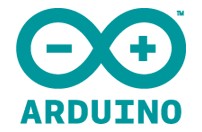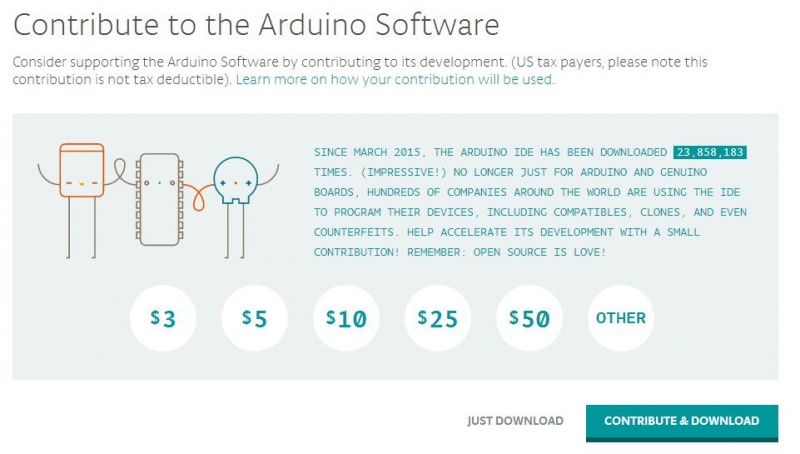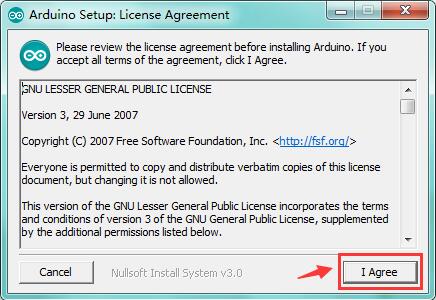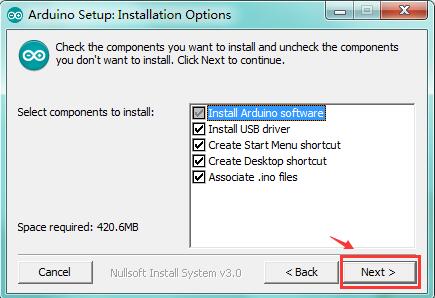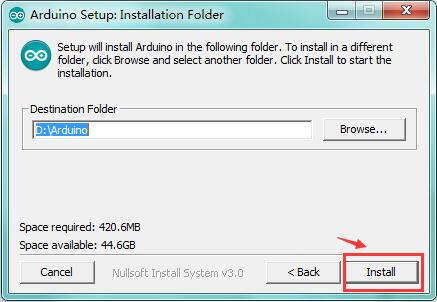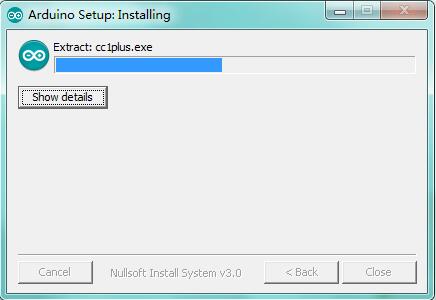Download Arduino IDE: Difference between revisions
Keyestudio (talk | contribs) (Created page with " <br> 400px|right|thumb| == Download Arduino Environment == You can directly download the latest version from this link: http://arduino.cc...") |
Keyestudio (talk | contribs) |
||
| (6 intermediate revisions by the same user not shown) | |||
| Line 26: | Line 26: | ||
Choose your board in the list here on the right to learn how to get started with it and how to use it on the Desktop IDE. | Choose your board in the list here on the right to learn how to get started with it and how to use it on the Desktop IDE. | ||
You can check all the Arduino software of old version from this link: | |||
https://www.arduino.cc/en/Main/OldSoftwareReleases#1.5.x | |||
<br> | <br> | ||
| Line 35: | Line 38: | ||
<br>[[File:Arduino IDE.jpg|800px|frameless|thumb]]<br> | <br>[[File:Arduino IDE.jpg|800px|frameless|thumb]]<br> | ||
The version available at this official website is usually the latest version. So in the following will show you the installation for this version.<br> In general, we will provide you with the Arduino 1.5.6 version package in our data. And the setup will be the same. | The version available at this official website is usually the latest version. So in the following will show you the installation for this version.<br> In general, we will provide you with the [https://drive.google.com/open?id=10a_m2F2J3qAFQEN4-QPYMWzSygVU1E2S Arduino 1.5.6 version package] in our data. And the setup will be the same. | ||
| Line 74: | Line 77: | ||
<br>[[File:Software.png|800px|frameless|thumb]]<br> | <br>[[File:Software.png|800px|frameless|thumb]]<br> | ||
<br> | Double-click the icon of Arduino to enter the desired development environment shown as below. | ||
<br>[[Image:717.png|600px|frameless]]<br> | |||
The functions of each button on the Toolbar are listed below: | |||
<br>[[Image:IDE.png|600px|frameless]]<br> | |||
{| width="80%" cellspacing="0" border="1" | |||
|- | |||
! align="center" scope="col" | <br>[[Image:IDE 1.png|600px|frameless]]<br> '''Verify/Compile''' | |||
! align="center" scope="col" | Check the code for errors | |||
|- | |||
! align="center" scope="col" | <br>[[Image:IDE 2.png|600px|frameless]]<br> '''Upload''' | |||
! align="center" scope="col" | Upload the current Sketch to the Arduino | |||
|- | |||
! align="center" scope="col" | <br>[[Image:IDE 3.png|600px|frameless]]<br> '''New''' | |||
! align="center" scope="col" | Create a new blank Sketch | |||
|- | |||
! align="center" scope="col" | <br>[[Image:IDE 4.png|600px|frameless]]<br> '''Open''' | |||
! align="center" scope="col" | Show a list of Sketches | |||
|- | |||
! align="center" scope="col" | <br>[[Image:IDE 5.png|600px|frameless]]<br> '''Save''' | |||
! align="center" scope="col" | Save the current Sketch | |||
|- | |||
! align="center" scope="col" | <br>[[Image:IDE 6.png|600px|frameless]]<br> '''Serial Monitor''' | |||
! align="center" scope="col" | Display the serial data being sent from the Arduino | |||
|- | |||
|} | |||
<br> | |||
== Reference for Arduino Programming Language == | == Reference for Arduino Programming Language == | ||
Latest revision as of 17:25, 25 July 2018
Download Arduino Environment
You can directly download the latest version from this link: http://arduino.cc/en/Main/Software. When the download is finished, unzip the downloaded file. Be sure to preserve the folder structure. Double-click the folder to open it. There should be several files and sub-folders inside.
The Arduino Software (IDE) allows you to write programs and upload them to your board. In the Arduino Software page you will find two options:
1. If you have a reliable Internet connection, you should use the online IDE (Arduino Web Editor). It will allow you to save your sketches in the cloud, having them available from any device and backed up. You will always have the most up-to-date version of the IDE without the need to install updates or community generated libraries.
2. If you would rather work offline, you should use the latest version of the desktop IDE .
Install the Arduino Desktop IDE
To get step-by-step instructions select one of the following link accordingly to your operating system.
Windows
Mac OS X
Linux
Portable IDE (Windows and Linux)
Choose your board in the list here on the right to learn how to get started with it and how to use it on the Desktop IDE.
You can check all the Arduino software of old version from this link: https://www.arduino.cc/en/Main/OldSoftwareReleases#1.5.x
Example for Installing Arduino IDE
STEP 1: Go to https://www.arduino.cc/en/Main/Software and find below page on the official website.
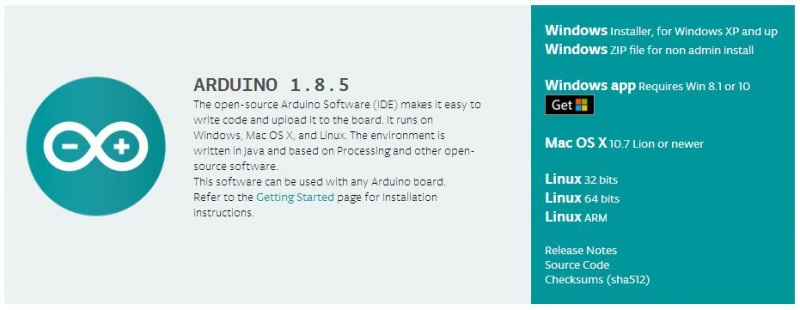
The version available at this official website is usually the latest version. So in the following will show you the installation for this version.
In general, we will provide you with the Arduino 1.5.6 version package in our data. And the setup will be the same.
STEP 2:Download the development software that is compatible with the operating system of your computer. In the following, take Windows as an example.
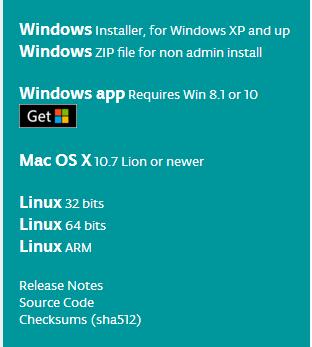
First, Click Windows Installer, you will get the following page.
Then, Click JUST DOWNLOAD. After downloading the software installation package to your PC, start the STEP 3 below.
STEP 3:Installing Arduino Software(Windows)
Install Arduino with the exe. Installation package you have downloaded well.
Get the latest version from the download page. You can choose between the Installer (.exe) and the Zip packages. We suggest you use the first one that installs directly everything you need to use the Arduino Software (IDE), including the drivers. With the Zip package you need to install the drivers manually. The Zip file is also useful if you want to create a portable installation.
When the download finishes, proceed with the installation and please allow the driver installation process when you get a warning from the operating system.
When the following interface appears, click Install to finish the installation.
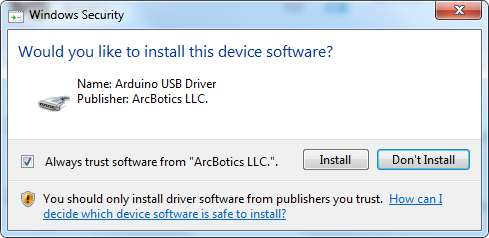
Finally, click “Close” after completing the installation.
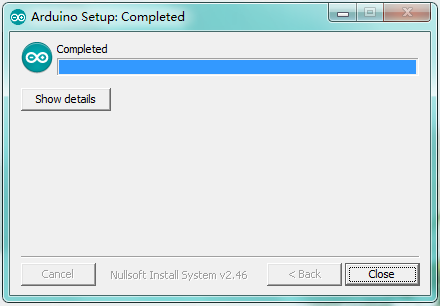
And you will see the following icon appear on the desktop

Double-click the icon of Arduino to enter the desired development environment shown as below.

The functions of each button on the Toolbar are listed below:
![]()
Reference for Arduino Programming Language
Arduino programming language can be divided in three main parts: structure, values (variables and constants), and functions.
You can see more details on the following link:
https://www.arduino.cc/reference/en/
